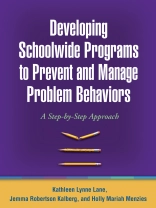Packed with hands-on tools and grounded in the latest research, this important resource provides guidelines for designing, implementing, and evaluating a schoolwide primary prevention program. The authors’ team-based, school-tested approach includes behavioral, academic, and social components that can be tailored to address any school’s needs. Each chapter presents real-world examples alongside essential information about how to prevent the development of antisocial behavior in grades K–12. Special features include sample forms and checklists for use in planning, staff training, screening and assessment, positive behavior support, and progress monitoring. The book also offers general guidelines for identifying and supporting students who require more intensive intervention.
Inhoudsopgave
1. Preventing and Managing Problem Behavior in Our Schools: A Formidable Task2. Primary Prevention across the K–12 Grade Span: Developing a Solid Foundation3. A Closer Look at the Positive Behavior Support Model4. Designing and Implementing Primary Prevention Models5. Assessment and Screening at the Primary Level6. Determining How Well the Program Is Working: Monitoring Outcomes and Identifying Nonresponsive Students7. Getting Started in Your School: Frequently Asked Questions
Over de auteur
Kathleen Lynne Lane, Ph D, is Professor in the Department of Special Education at the University of Kansas. Jemma Robertson Kalberg, MEd, is a special education teacher at Seneca Center in San Leandro, California. Holly Mariah Menzies, Ph D, is Associate Professor in the Charter College of Education at California State University, Los Angeles, and the program coordinator in mild-moderate disabilities in the Division of Special Education and Counseling.












